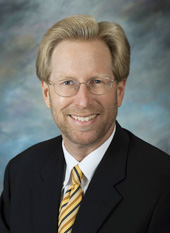Halls of Fame
 "Truly, I say to you, as you did it to one of the least of these, my brothers and sisters, you did it to me." - Matthew 25:40, (ESV)
"Truly, I say to you, as you did it to one of the least of these, my brothers and sisters, you did it to me." - Matthew 25:40, (ESV)
Mark A. Lowry
It was the parable of the talents (Matthew 25) that guided Mark Lowry into his life's work. "My best friend Tim Miller and I always talked about fighting crime and injustice," Mark says. "We planned to go into law enforcement together, which is why I took my first class, Introduction to Law Enforcement, under Prof. George Wright while I was still a senior in high school.
"I loved Prof. Wright's class; he was captivating, dynamic, and animated. He made law enforcement vivid.
"I also had an internship at the Santa Ana Police Department, and I loved the officers, the ride-alongs, and the excitement of the Code 3 chases, but I also saw how the stress affected the officers in a variety of ways. As Tim went through the police academy, he began to change in ways that were unexpected, and I came to believe that a career in law enforcement was not the way I wanted to serve. Tim continued his career in law enforcement and I went into social services. Instead of criminal justice, I'm in social justice."
His next class, Introduction to Philosophy, was another pivotal course in his journey toward a career dedicated to social justice. "Prof. Vasquez' class was very provocative and stimulating. It was also one of the core classes that helped create a solid foundation for me to pursue a Bachelor of Arts degree in social ecology from the University of California, Irvine. Social ecology includes public planning and policy; environmental studies, human behavior and social behavior. It involves a lot of abstract and critical thinking; in order to understand social issues, you have to understand how they interrelate to inform the total issue, and to then craft creative solutions."
After receiving degrees in Administration of Justice from SAC (1977) and a Bachelor of Arts degree in Social Ecology from UCI (1979), Mark was employed by Lutheran Social Services as Marketing Director for a start-up program, Censorview, and then as an Occupancy Specialist for the Orange County Housing Authority. In 1987 he found his niche in the Community Action Partnership of Orange County, first as a research analyst, then as manager of a homeless services program. In 1989 he became manager of the Orange County Food Bank, a position that was upgraded to director as the operation grew.
In this capacity, Mark not only helps feed the hungry, he also maintains close ties to community resources, including Santa Ana College. "In addition to its academic courses, SAC has a long tradition of community service. Dozens of SAC students have worked at the Food Bank, coming both in groups and individually, often through the college's Service Learning Department.
"For example, three young girls taking a math class at SAC came to the Food Bank to volunteer. We administer a federal nutrition program that serves seniors, and volunteers package the six different food boxes that we distribute, each based on specific nutritional needs. A total of 23,000 food boxes are distributed every month to seniors. We wanted to find out the financial impact of that program on the community.
"The students did price surveys based on six distinct menus at three different types of retail outlets: a mini-mart convenience store, which is typically the most expensive; an average grocery store, such as Ralphs/Stater Bros/Vons, and then "big box" stores such as Costco and Food4Less.
"They came up with a mean price for each product, and a mean price for each of the six different food boxes, which revealed that those boxes represent more than $10 million in food distributed just to seniors. (23,000 boxes/month x 12 months x $37 per box) This data gave me the ability to describe our service in terms of financial impact on the community."
Because the college has this tradition of community service, Mark says that he tries to personally staff tables at events on campus that promote volunteer opportunities.
In reflection, Mark says, "There are a host of complicated social and economic issues such as the cost of housing, the kinds and availability of jobs, the range of wages and salaries, that make the food bank necessary. Hunger in a community like ours is simply a symptom of deeper underlying issues. Classes I took at SAC and at UCI gave me the foundation to understand the complexities of issues that contribute to social problems, and identify potential solutions."
Mark is a frequent speaker in a variety of venues, and is an often-quoted source for media outlets on the economy, hunger, food, and nutrition. He organizes high-profile annual events, such as National Family Volunteer Day, which raised $20,000 and attracted 781 volunteers who assembled 14,757 food boxes during the 2008 event.
Most recently, Mark worked with the Board of Directors of the Great Park in Irvine to advocate for an agricultural element. As a result, designers agreed to dedicate 125 acres for agricultural use and donate a portion of each crop to the Food Bank on an ongoing basis. The arrangement has already produced nearly 100 tons of locally grown fresh fruits and vegetables that have been distributed to vulnerable Orange County residents.
When asked his marital status, Mark would check the "single" box, but it is clear that he is married to pursuing innumerable issues and opportunities related to social and economic justice that will feed the hungry, clothe the naked, and comfort those in need (Matthew 25:35-36).
